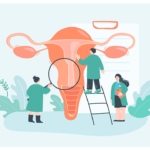Can Vaginismus Lead To Infertility?

Allo Health is dedicated to personalized well-being, offering support and trusted information tailored to individual health goals. The platform emphasizes human-generated content, led by a distinguished medical team of experts, including physicians and sexual health specialists. Their commitment to credibility involves rigorous fact-checking, authoritative research, and continuous updates to ensure accurate, up-to-date information. Allo Health's unique approach goes beyond conventional platforms, providing expert-led insights and a continuous commitment to excellence, with user feedback playing a crucial role in shaping the platform's authoritative voice.

Dr Dodda Basavaraj did his MBBS from Vijayanagara Institute Of Medical Sciences, Ballari . His domain of interest always lied in obstetrics , gynaecology and sexual health. He has worked as Medical officer, Tele-consultation doctor at tertiary and primary health care sectors in Karnataka . He believes strongly in medical practice which is evidence based, non-judgemental and patient centric.
Why This Was Upated?
Our experts continually monitor the health and wellness space, and we update our articles when new information became available.
Updated on 18 June, 2024
- Article was updated as part of our commitment to diversity, equity, and inclusion.

"The following blog article provides general information and insights on various topics. However, it is important to note that the information presented is not intended as professional advice in any specific field or area. The content of this blog is for general educational and informational purposes only.
Book consultation
The content should not be interpreted as endorsement, recommendation, or guarantee of any product, service, or information mentioned. Readers are solely responsible for the decisions and actions they take based on the information provided in this blog. It is essential to exercise individual judgment, critical thinking, and personal responsibility when applying or implementing any information or suggestions discussed in the blog."
Vaginismus is a condition that affects individuals with a vagina and is characterized by involuntary muscle spasms in the pelvic floor muscles surrounding the vaginal opening. These muscle contractions can make it difficult or impossible to engage in vaginal penetration, including sexual intercourse, the insertion of tampons, or even undergoing a pelvic examination. The symptoms of vaginismus can vary in severity but can Vaginismus cause Infertility?
Vaginismus Symptoms
- Painful intercourse (dyspareunia): The most common symptom of vaginismus is pain during attempted sexual intercourse. The muscle spasms can make penetration painful, causing discomfort, burning, or a feeling of tightness or constriction in the vaginal area.
- Difficulty with tampon insertion: Women with vaginismus may find it challenging or impossible to insert a tampon. The muscle contractions and pain can prevent the tampon from being inserted comfortably.
- Fear or anxiety related to vaginal penetration: Due to the pain and discomfort associated with vaginismus, individuals may develop a fear or anxiety response when it comes to any form of vaginal penetration. This fear can contribute to a cycle of anticipation and muscle tension, making the condition worse.
- Involuntary muscle spasms: Vaginismus is characterized by involuntary muscle contractions in the pelvic floor muscles. These spasms occur without conscious control and can make the vaginal opening feel tight, closed off, or completely inaccessible.
- Avoidance of sexual activity: Women with vaginismus may avoid sexual activity altogether due to the fear and pain associated with penetration. This can have a significant impact on sexual relationships and overall quality of life.
- Emotional distress and relationship difficulties: Vaginismus can cause emotional distress, frustration, and a sense of inadequacy or guilt. It may also lead to relationship difficulties, as the condition can strain intimacy and communication between partners.
The severity of symptoms can vary from person to person. Some individuals may experience mild discomfort or tightness, while others may have intense pain and complete avoidance of any form of vaginal penetration. If you suspect you may have vaginismus or are experiencing any of these symptoms, it is advisable to consult with a healthcare professional, such as a gynecologist or a sex therapist, who can provide an accurate diagnosis and recommend appropriate treatment options.
Vaginismus Causes
The exact causes of vaginismus can vary from person to person, and in many cases, it can be a combination of physical, psychological, and emotional factors. Here are some potential causes and contributing factors of vaginismus:
- Fear and Anxiety: Fear and anxiety surrounding sex or vaginal penetration are common factors in vaginismus. Past traumatic sexual experiences, such as sexual abuse or assault, can contribute to the development of vaginismus. Fear of pain, concerns about performance, or negative beliefs about sex can also trigger the involuntary muscle contractions.
- Psychological Factors: Psychological factors, such as stress, anxiety disorders, body image concerns, or a history of sexual repression or guilt, can contribute to the development of vaginismus. Negative or distorted beliefs about sex, sexuality, or the body can create a mental barrier that manifests as physical muscle tension.
- Trauma: Experiences of physical or emotional trauma, including sexual trauma, can lead to the development of vaginismus. Trauma can cause the body to respond by tightening the muscles as a protective mechanism.
- Relationship concerns: Concerns within a sexual or intimate relationship, such as lack of communication, unresolved conflicts, or a lack of emotional connection, can contribute to the development or persistence of vaginismus. A strained relationship can create tension, anxiety, and fear, which can exacerbate the muscle spasms.
- Physical Factors: In some cases, physical factors can contribute to vaginismus. These may include infections or medical conditions affecting the genital area, such as recurrent yeast infections, urinary tract infections, or endometriosis. Vaginal dryness or irritation can also trigger pain and muscle spasms.
- Cultural or Religious Factors: Sociocultural factors, including cultural or religious beliefs about sex, modesty, or the role of women, can influence the development of vaginismus. Upbringing in an environment that stigmatizes or shames sexual activity can contribute to feelings of fear, guilt, or anxiety around vaginal penetration.
Vaginismus Treatment
The treatment of vaginismus typically involves a multidimensional approach that addresses both the physical and psychological aspects of the condition. Here are some common treatment options for vaginismus:
- Education and Counseling: Education about vaginismus and its causes can help individuals understand the condition and reduce anxiety. Counseling or therapy, such as cognitive-behavioral therapy (CBT), can help address any underlying psychological factors, fears, or traumatic experiences that may be contributing to vaginismus.
- Pelvic Floor Physical Therapy: Pelvic floor physical therapy involves working with a specialized physical therapist who can help individuals learn to relax and control their pelvic floor muscles. Techniques may include pelvic floor exercises, relaxation techniques, biofeedback, and manual therapy to release muscle tension. This therapy aims to improve muscle coordination and reduce pain or discomfort during sexual penetration.
- Graduated Exposure Therapy: Graduated exposure therapy involves a systematic desensitization process where individuals gradually and incrementally expose themselves to increasingly larger vaginal dilators or other objects to help overcome the fear and muscle spasms associated with vaginismus. This approach allows for a step-by-step progression towards comfortable vaginal penetration.
- Sexual Counseling and Sensate Focus: Sexual counseling or therapy can help individuals and their partners explore non-penetrative sexual activities and enhance intimacy and communication. Sensate focus exercises, where couples focus on sensual touch without the goal of penetration, can help reduce performance anxiety and pressure.
- Topical Medications: In some cases, healthcare professionals may recommend the use of topical anesthetics or lubricants to reduce pain and discomfort during attempted penetration. These medications can help temporarily alleviate symptoms and facilitate the process of desensitization.
- Support Groups: Participating in support groups or connecting with others who have experienced vaginismus can provide valuable emotional support, encouragement, and a sense of community. Sharing experiences and learning from others can help individuals feel less isolated and more empowered in their journey towards recovery.

Health Impacts & Consequences Of Untreated Vaginismus
Untreated vaginismus can have various health impacts and consequences, both physical and psychological. Here are some of the potential effects of leaving vaginismus untreated:
- Pain and Discomfort: The primary consequence of untreated vaginismus is ongoing pain and discomfort during attempts at vaginal penetration. This can severely impact sexual activity, making intercourse or even the insertion of tampons or medical devices highly painful or impossible. It can lead to frustration, anxiety, and a negative impact on the individual’s sexual relationships and overall quality of life.
- Sexual Dysfunction: Vaginismus can result in sexual dysfunction, including difficulties with arousal, desire, and orgasm. The fear, pain, and anxiety associated with vaginal penetration can interfere with sexual pleasure and satisfaction.
- Relationship concerns: Untreated vaginismus can strain intimate relationships. The pain and avoidance of sexual activity can lead to a lack of intimacy, communication concerns, and feelings of frustration or resentment between partners. Over time, this can put a significant strain on the relationship.
- Emotional Distress: Vaginismus can cause significant emotional distress and negatively impact an individual’s self-esteem, body image, and overall well-being. The inability to engage in vaginal penetration can lead to feelings of inadequacy, guilt, shame, or a sense of being “broken” sexually. It can also contribute to anxiety, depression, or other mental health concerns.
- Impact on Reproductive Health: Untreated vaginismus may affect reproductive health. If individuals with vaginismus are unable to undergo pelvic examinations, it can make it challenging to receive appropriate gynecological care. This can lead to delays in the diagnosis or treatment of other gynecological conditions or prevent access to contraception or fertility-related interventions.
- Reduced Quality of Life: The physical and psychological effects of untreated vaginismus can significantly impact an individual’s overall quality of life. It can restrict sexual intimacy, hinder reproductive choices, and contribute to emotional distress, leading to a diminished sense of well-being and satisfaction in various aspects of life.
Can Vaginismus Cause Infertility?
Vaginismus itself does not directly cause infertility. Infertility refers to the inability to conceive a child after a year or more of regular, unprotected sexual intercourse. Vaginismus, on the other hand, is a condition characterized by involuntary muscle spasms in the pelvic floor muscles that make vaginal penetration difficult or impossible.
Vaginismus can indirectly impact fertility by making it challenging to engage in sexual intercourse, including attempts at conception. The pain, discomfort, and fear associated with vaginismus can make it difficult for individuals to engage in penetrative intercourse, which is necessary for sperm to reach the cervix and fertilize an egg.
If a person with vaginismus is trying to conceive, they may face challenges in achieving pregnancy due to the difficulties with vaginal penetration. It’s important to note that fertility is a complex matter influenced by various factors, including ovulation, sperm quality, fallopian tube health, and more. Vaginismus alone does not affect the biological processes of ovulation or sperm production.
It is crucial for individuals experiencing vaginismus and difficulties with conception to seek appropriate medical and psychological support. A healthcare professional specializing in sexual health, such as a gynecologist or reproductive endocrinologist, can provide guidance, support, and potential treatment options to address the vaginismus and improve the chances of conception.
There are alternative methods of conception available, such as intrauterine insemination (IUI) or in vitro fertilization (IVF), which bypass the need for penetrative intercourse. These methods can be considered if vaginismus poses significant challenges to natural conception.
Is Lack Of Sex Education Contributing To Vaginismus Prevalence?

The lack of comprehensive sex education can contribute to the prevalence of vaginismus and other sexual concerns. Here’s how:
- Lack of Awareness: Insufficient sex education often leads to a lack of awareness and understanding of normal sexual functioning and experiences. Many individuals may not be aware that conditions like vaginismus exist or that they are treatable. This lack of awareness can delay seeking help and perpetuate the belief that the concern is solely their own, leading to feelings of shame or isolation.
- Misinformation and Myths: In the absence of accurate information, individuals may rely on myths, misconceptions, or unreliable sources for information about sex. This misinformation can lead to unrealistic expectations, anxiety, or incorrect beliefs about the body and sexual functioning. For example, individuals may believe that pain during intercourse is normal or inevitable, rather than recognizing it as a potential symptom of a treatable condition like vaginismus.
- Stigma and Shame: In societies with limited or inadequate sex education, discussing sexual matters openly may be taboo or stigmatized. This can create an environment of shame, making it difficult for individuals with vaginismus or other sexual concerns to seek help or openly discuss their concerns. The lack of understanding and support can exacerbate the emotional distress associated with vaginismus.
- Limited Communication Skills: Comprehensive sex education typically includes teaching effective communication skills, including consent, negotiation, and expressing sexual needs and boundaries. Without these skills, individuals may struggle to communicate about their experiences, desires, and concerns related to sexual activity, including vaginismus. This can hinder seeking help, receiving support from partners, or engaging in effective dialogue with healthcare professionals.
- Psychological Factors: Sex education that addresses the emotional and psychological aspects of sexuality can help individuals develop a healthy attitude towards sex and their bodies. Without this knowledge, individuals may internalize negative beliefs, experience anxiety, or develop fear or guilt around sexual activities. These psychological factors can contribute to the development or persistence of vaginismus.
Are Traditional Views Contributing To Vaginismus Prevalence?
Traditional views and societal attitudes towards sex can indeed contribute to the prevalence of vaginismus. Here’s how traditional views can impact the occurrence and persistence of vaginismus:
- Sexuality Taboos: Traditional views often enforce strict taboos around discussing and openly addressing sexual matters. This can create an environment of silence and shame surrounding sexual concerns, including vaginismus. Individuals may feel embarrassed, guilty, or abnormal for experiencing difficulties with vaginal penetration, which can hinder seeking help and contribute to the persistence of the condition.
- Lack of Comprehensive Sex Education: Traditional views may discourage or limit comprehensive sex education that provides accurate information about sexual health, anatomy, and functioning. Without proper education, individuals may lack the knowledge and understanding necessary to recognize and address sexual concerns like vaginismus. The absence of education can perpetuate misconceptions, myths, and stigmas related to sexuality, making it difficult for individuals to seek appropriate support.
- Gender Roles and Expectations: Traditional views often uphold rigid gender roles and expectations, which can place additional pressure and anxiety on individuals experiencing vaginismus. Women, in particular, may feel a sense of failure or inadequacy if they cannot engage in penetrative intercourse. Traditional gender norms may reinforce the idea that sexual intercourse is the ultimate goal and expectation within a relationship, increasing the psychological distress associated with vaginismus.
- Lack of Female Sexual Agency: Traditional views may undermine female sexual agency, emphasizing the importance of male pleasure and prioritizing male sexual satisfaction over female comfort and consent. This can create an environment where women feel less empowered to communicate their needs, boundaries, and experiences related to sexual activity, including vaginismus. The lack of agency and communication skills can hinder seeking help and accessing appropriate treatment.
- Cultural and Religious Beliefs: Cultural and religious beliefs that stigmatize or shame sexual activities can contribute to the persistence of vaginismus. Messages of sexual guilt, sinfulness, or the perception of sex as solely for procreation may create psychological barriers and anxiety around engaging in sexual activities. These beliefs can lead to feelings of fear, shame, or moral conflict, exacerbating the muscle tension and involuntary spasms associated with vaginismus.
Addressing traditional views and promoting a more open, inclusive, and sex-positive society can help reduce the prevalence of vaginismus. This includes comprehensive sex education that covers topics of consent, communication, and sexual health, as well as challenging gender stereotypes and providing support for individuals to openly discuss and seek help for sexual concerns without shame or judgment.
Frequently Asked Questions
(1) Is vaginismus a common cause of infertility?
Vaginismus is not a common cause of infertility. While it can make conception challenging due to difficulties with vaginal penetration, there are various other factors that contribute to infertility, such as ovulation concerns, sperm quality, fallopian tube health, or hormonal imbalances.
(2) Can treating vaginismus improve fertility?
Treating vaginismus can improve the chances of conceiving. By addressing the muscle spasms and pain associated with vaginismus through therapy, pelvic floor exercises, or other interventions, individuals may be able to engage in comfortable and pleasurable penetrative intercourse, increasing the likelihood of successful conception.
(3) Are there alternative methods for conception if vaginismus is present?
Yes, there are alternative methods for conception if vaginismus poses challenges to natural intercourse. Techniques such as intrauterine insemination (IUI) or in vitro fertilization (IVF) can bypass the need for vaginal penetration, offering alternative routes for achieving pregnancy.
(4) Should individuals with vaginismus seek medical help for fertility concerns?
If individuals with vaginismus are experiencing difficulties conceiving or have concerns about their fertility, it is advisable to consult with a healthcare professional specializing in sexual health or reproductive medicine. They can provide guidance, conduct necessary tests, and recommend appropriate interventions or fertility treatments based on individual circumstances.
(5) Is vaginismus a permanent condition that always leads to infertility?
Vaginismus is not necessarily a permanent condition, and with appropriate treatment, many individuals experience significant improvement or complete resolution of symptoms. Additionally, vaginismus alone does not directly cause infertility. Seeking treatment for vaginismus can help improve sexual function and increase the chances of successful conception.
(6) Can vaginismus be a secondary cause of infertility?
Vaginismus itself is not a direct cause of infertility, but it can contribute to difficulties with conception. In cases where vaginismus prevents or makes intercourse challenging, it may be considered a secondary factor contributing to infertility. Treating vaginismus can address this barrier and potentially improve fertility outcomes.
(7) Does treating vaginismus guarantee successful conception?
Treating vaginismus does not guarantee successful conception. While addressing vaginismus can improve the ability to engage in penetrative intercourse, other factors can influence fertility. It is important to consider additional factors such as ovulation, sperm quality, and overall reproductive health when seeking to achieve pregnancy.
(8) Can fertility treatments worsen vaginismus symptoms?
Fertility treatments, such as intrauterine insemination (IUI) or in vitro fertilization (IVF), typically do not worsen vaginismus symptoms. In fact, fertility specialists are often experienced in working with individuals who have sexual difficulties and can offer support and guidance to ensure that the treatment process is comfortable and minimizes any potential exacerbation of symptoms.
(9) Are there support resources available for individuals dealing with vaginismus and fertility concerns? Yes, there are support resources available for individuals dealing with vaginismus and fertility concerns. Support groups, online communities, and specialized healthcare professionals can provide valuable information, guidance, and emotional support for individuals navigating both vaginismus and fertility-related challenges.






































